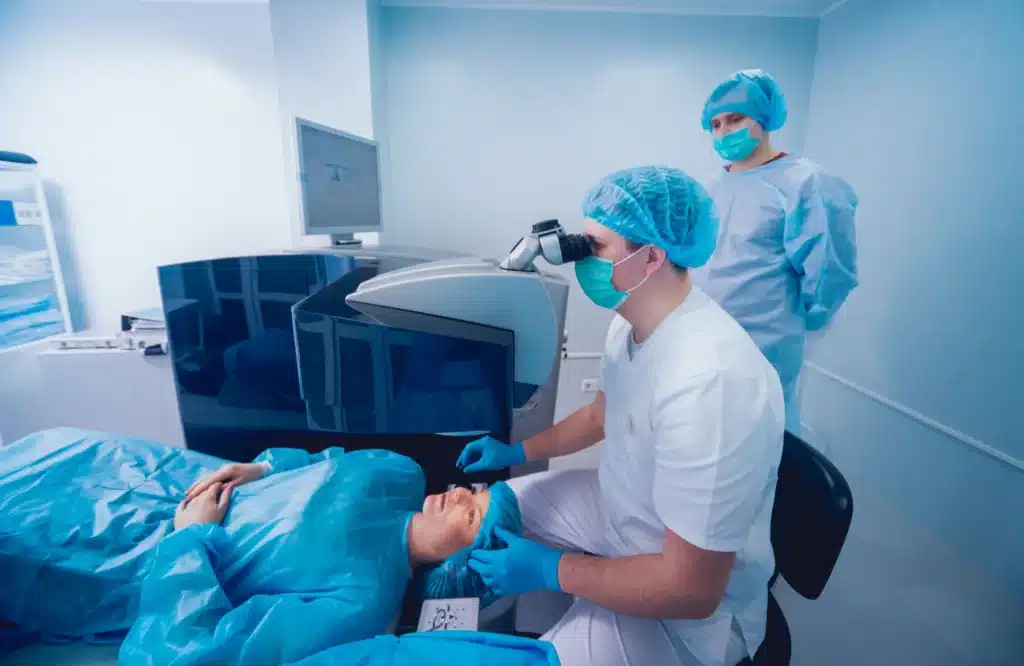Medically Reviewed by: Edward C. Wade, M.D., F.A.C.S.
How Old Do You Have to Be to Get LASIK?
If you’re growing tired of the hassle that comes with wearing glasses or contact lenses day after day, you may have considered getting LASIK eye surgery. But how old do you have to be to get LASIK? Many potential candidates, especially younger or older people who experience vision problems, find themselves wondering whether they’re the right age for the procedure. Age is a crucial factor for LASIK, and whether or not the timing is right can actually mean the difference between excellent vision correction and a less-than-favorable outcome.
For anyone contemplating getting LASIK, the Eye Center of Texas ophthalmologists are here to explain the LASIK surgery age limit and how it relates to eligibility, helping you assess the right time to take the leap for clearer vision.
What is the LASIK surgery age limit?
While there is no LASIK surgery age limit, there is a minimum LASIK age requirement. How old do you have to be to get LASIK? According to the FDA, you have to be at least 18 years old to get LASIK eye surgery. At 18 years old, your eyes have likely reached ocular and physical maturity meaning your corneas, which will be reshaped during LASIK, will have stabilized enough to receive the surgery.
However, very few individuals at 18 are ideal candidates for LASIK due to the likelihood of continued prescription changes through their 20s. The minimum age requirement is a starting point for when you can get LASIK, but most doctors will recommend holding off on getting LASIK until you are in your 20s.
What age is best for LASIK?
The best age to get LASIK is generally between 20 and 40. This is because by age 20, most people’s prescriptions have stabilized, and their corneas have settled into their permanent new shape, which will yield the best results post-procedure, and cause fewer complications.
Is LASIK worth it in your 20s?
For many people in their 20s, LASIK can be a rewarding investment, particularly for those with a stable prescription who want to enjoy their 20s free from glasses or contacts. If you have an active lifestyle, love to travel, or are experiencing a lot of changes that this time in your life will bring, having clear vision can be a great convenience and a huge quality of life improvement.
Many doctors would say that the best age to get LASIK would be around age 25, as your vision is likely to be completely stabilized and you are unlikely to have developed conditions like presbyopia that can make LASIK a little more difficult. So, for most people looking to get LASIK in their 20s, your doctor would agree that it is generally a good time.
Is it worth getting LASIK after 40?
Patients over 40 may experience presbyopia, an age-related condition that affects near-vision — for these individuals, monovision LASIK or other types of LASIK procedures may be more appropriate. Getting LASIK in your 20s or 30s can likely offer you a longer lifetime of freedom from glasses or contacts. While getting LASIK later in life is still effective, it might not provide the decades-long benefit that younger patients enjoy.
Again, there is no LASIK surgery age limit, but certain ages and conditions may disqualify you from being an ideal LASIK candidate.
What disqualifies you for LASIK?
Unfortunately, not everyone is an ideal candidate for LASIK, and not meeting certain LASIK eye surgery qualifications can disqualify a person from undergoing the procedure. If you meet any of the following criteria, you may not be eligible for LASIK eye surgery:
- You are under the age of 18: If you are under the age of 18, your eyes have likely not finished developing and your vision may continue to change. As mentioned above, most doctors may ask you to wait until you are in your 20s to get LASIK to ensure you can fully enjoy the benefits.
- Your eyes are not in good health: As a rule of thumb, doctors prefer for your eyesight to remain stable for at least one year before getting LASIK. Conditions such as keratoconus, glaucoma, or cataracts often disqualify patients from candidacy for LASIK due to the progression of these diseases or the increased risk of complications. Other health conditions such as diabetes or any autoimmune or vascular diseases can also exclude you from LASIK candidacy for similar reasons.
- You have thin corneas: Having thin corneas can prevent the creation of a proper flap during the surgery, which is essential for reshaping the cornea. Your corneas must be a minimum of 0.5 mm thick for you to be considered a potential LASIK candidate.
- You have severe dry eye syndrome: Dry eyes can cause worsened side effects and symptoms after LASIK surgery.
- You are pregnant or nursing: Hormonal changes during pregnancy can affect vision stability, making it best to wait until after pregnancy and nursing to consider LASIK. It is also important to note that pregnant/nursing individuals may not be able to take certain LASIK prescriptions due to their effects on hormones. However, you can become a candidate for LASIK post-nursing.
It’s important for potential LASIK candidates to have a thorough examination and discuss any medical history or concerns with an ophthalmologist to ensure the safety and effectiveness of the procedure for their specific case.
Is LASIK treatment safe?
Yes! LASIK is considered a very safe and effective eye surgery that can improve your vision and overall quality of life. While complications and side effects are possible, they are rare. This is why we put significant effort into determining LASIK candidacy so that you and your doctor can be sure whether or not LASIK will be a safe and effective option for you.
When you are preparing for LASIK surgery, make sure that you pick a reputable surgeon — we have a whole article on how to choose a LASIK surgeon — who will explain all of the risks and side effects to you carefully. This is the best way to ensure that you will get the results that you want from your vision procedure.
Eye Center of Texas provides eye care to patients of all ages
So, how old do you have to be to get LASIK? Although the minimum LASIK age requirement is 18, most doctors will recommend waiting until you are in your 20s to get LASIK. No matter your age, Eye Center of Texas has vision solutions that can help you to improve your eyesight and your overall quality of life.
The acumen of our LASIK surgeons speaks for itself. Our Houston LASIK surgeons — such as Dr. Mark L. Mayo, Dr. Yasir Ahmed, and Dr. Edward C. Wade — have completed over 75,000 successful LASIK procedures. In fact, Dr. Mayo and Dr. Wade were two of the first eye surgeons in Houston to practice blade-free eye surgery.
Put your eye care into the hands of surgeons you can trust at Eye Center of Texas. We offer LASIK at our locations throughout Texas including Houston/Bellaire, Pasadena, Sugar Land, Clear Lake, Katy, and The Woodlands/Conroe. Request an appointment today to see if you are a candidate!
More Helpful Articles by Eye Center of Texas:
Financing Options Available
Apply today to find a financing option that meets your needs.
Our Locations
Houston/Bellaire
6565 W. Loop S., Suite 650Bellaire, TX 77401
Medical Office:
713-797-1010
Medical Fax:
713-357-7276
LASIK/Near Vision:
Office: 713-395-1515
Fax: 713-357-7278
Pasadena
4415 Crenshaw RoadPasadena, TX 77504
Medical Office:
281-977-8800
Medical Fax:
281-977-8877
Sugar Land
15200 S.W. Freeway, Suite 130Sugar Land, TX 77478
Medical Office:
281-277-1010
Medical Fax:
281-277-4504
Clear Lake
455 E. Medical Center Blvd., Suite 110Webster, TX 77598
Medical Office:
281-332-1397
Medical Fax:
281-282-9152
Katy
Greenhouse Medical Plaza2051 Greenhouse Road, Suite 110
Houston, TX 77084
Medical Office:
346-547-7070
Medical Fax:
281-214-2971
The Woodlands/Conroe
100 Medical Center Blvd., Suite 118Conroe, TX 77304
Medical Office:
936-647-1610
Medical Fax:
936-647-1620


